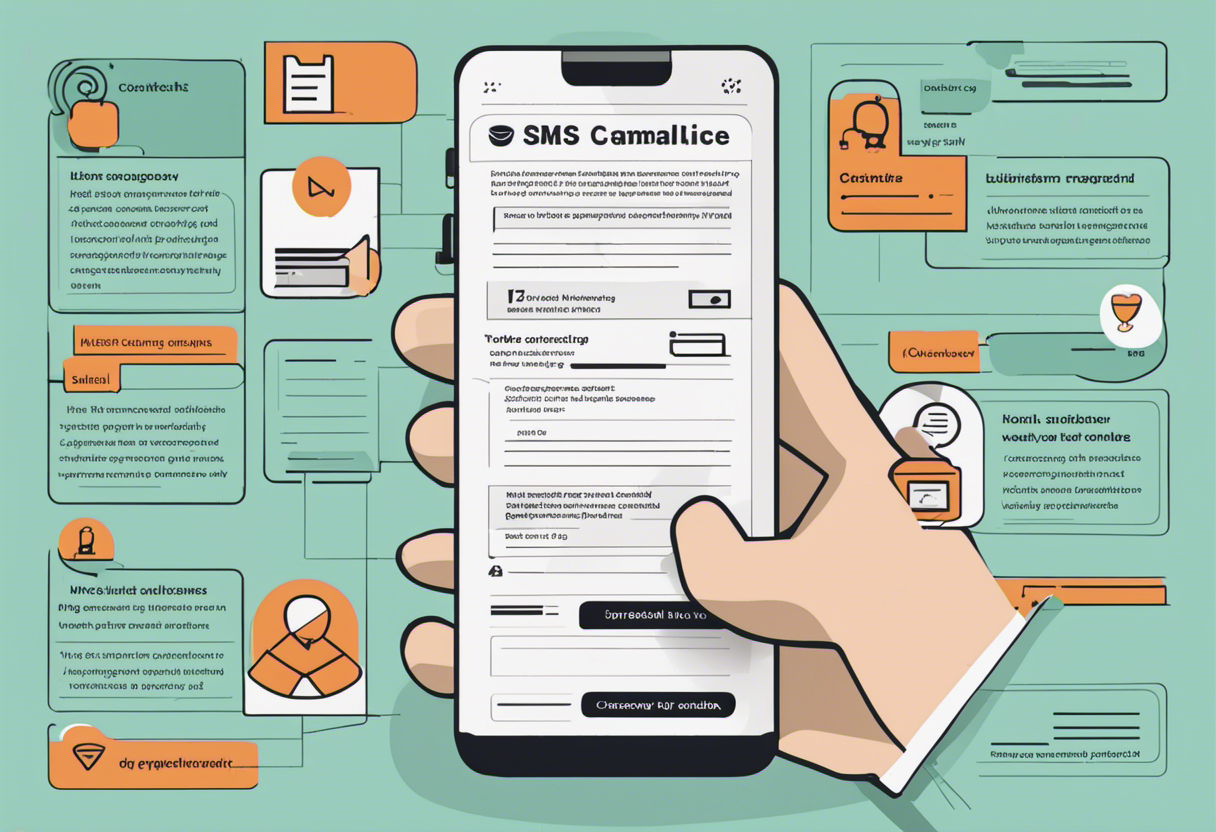
Navigating the Legal Pitfalls of SMS Marketing:Ensuring Compliance and Avoiding Penalties
- USpeedo
- SMS
- 09 Nov, 2023
SMS marketing has become an essential tool for businesses looking to engage with their customers in a personal and direct way. However, as with any marketing strategy, there are legal obligations and regulations that must be followed to avoid penalties and maintain compliance. In this article, we will explore the key legal considerations for SMS marketing, best practices for compliance, and the consequences of non-compliance.
Understanding SMS Marketing Regulations
Before diving into the legal aspects of SMS marketing, it’s crucial to understand the regulatory landscape surrounding this form of communication. In many countries, various laws and regulations protect consumers’ privacy and govern marketing practices. Some of the relevant regulations include:
- Telephone Consumer Protection Act (TCPA) - In the United States, the TCPA regulates sending text messages to consumers. It requires businesses to obtain prior express written consent from recipients before sending commercial SMS messages. Additionally, it mandates providing an opt-out mechanism and limits the timing of messages.
- General Data Protection Regulation (GDPR) - The European Union’s GDPR applies to businesses operating within EU member countries or processing personal data of EU residents. It outlines strict rules for obtaining consent, protecting data, and providing individuals with control over their personal information.
- Canadian Anti-Spam Legislation (CASL) - CASL applies to businesses sending commercial electronic messages (including SMS) in Canada. It requires obtaining consent from recipients and providing a clear opt-out mechanism.
These are just a few examples of the regulations in place globally. It’s essential for businesses engaging in SMS marketing to research and understand the specific regulations within their target markets.
Key Legal Considerations for SMS Marketing
To ensure compliance with SMS marketing regulations, businesses must pay attention to several key legal considerations:
- Obtaining Consent: Consent is the cornerstone of SMS marketing compliance. Before sending any text messages, businesses must obtain clear and documented consent from recipients. This consent should be freely given, specific, informed, and indicated through a positive action. Best practices for obtaining consent include using clear and concise language, providing information about the purpose and frequency of messages, and offering an easy opt-in/opt-out process.
Obtaining explicit consent from recipients is crucial for SMS marketing compliance. To protect your business from penalties, ensure that consent is freely given, specific, and well-documented.
-
Providing Opt-Out Mechanism: Along with obtaining consent, businesses must offer recipients an easy and effective opt-out mechanism. Each message sent should include clear instructions on how to unsubscribe from future communications. It’s important to honor these unsubscribe requests promptly to avoid violating regulations.
-
Complying with Frequency and Timing Restrictions: SMS marketing regulations often impose restrictions on the frequency and timing of messages. Some jurisdictions require businesses to limit the number of messages sent per day, while others may restrict sending messages during specified hours (e.g., late at night or early in the morning). It’s essential to understand and adhere to these limitations to ensure compliance.
-
Protecting Personal Data: Businesses need to handle personal data collected for SMS marketing campaigns securely. This includes taking measures to protect data from unauthorized access or disclosure and ensuring that data is only used for the stated purposes. Implementing appropriate data protection measures, such as encryption and access controls, can help businesses meet these obligations.
Best Practices for SMS Marketing Compliance
To navigate the legal pitfalls of SMS marketing and ensure compliance, businesses should follow these best practices:
- Document Consent with Context: Beyond mere consent, capture the context and scope of permissions granted. For instance, differentiate between opt-ins for promotional messages versus transactional updates. Record not only the consent itself but also the specific marketing preferences expressed by the recipient. For instance, a customer may consent to receiving promotional messages but not wish to receive any SMS surveys.
- Illustrative Example: Consider a scenario where a customer provides consent through a website form. Not only record the timestamp and method of consent collection but also document the specific checkboxes or language the customer interacted with to give consent. This nuanced recording is vital in demonstrating compliance in case of legal scrutiny.
- Maintain a Comprehensive Opt-Out Database: Alongside respecting opt-out requests, consider offering varying opt-out options. Some recipients might prefer to limit the frequency of messages rather than completely opt-out. Keeping a nuanced opt-out database that caters to different preferences can enhance customer satisfaction and retention.
- Employee Training Tailored to Scenarios: Instead of generic training, provide case-based or scenario-specific education to employees. Create simulations or case studies to illustrate various compliance scenarios. This personalized approach equips employees with practical knowledge, making it easier for them to navigate diverse situations within legal boundaries.
- Using Contextual Language: Contextual clarity matters. If offering different types of SMS content, employ language that reflects the specific nature of each message. For instance, a promotional message could clearly state the offer, while a transactional message might emphasize order or delivery details. This nuanced use of language not only ensures compliance but also enriches the recipient experience.
- Adaptive Policy Reviews: Regular policy reviews should not only encompass regulatory updates but also consider shifts in consumer behavior and technological advancements. For instance, the emergence of new platforms or changes in consumer preferences might warrant alterations in SMS marketing strategies.
- Proactive Audits with Corrective Measures: Audits need not solely focus on identifying compliance gaps. They should also serve as diagnostic tools to enhance overall marketing strategies. These audits could unveil not just areas of non-compliance but also insights into customer engagement and preferences, thus offering a dual benefit.
Ultimately, SMS marketing compliance should not be seen merely as a legal obligation but as an opportunity to build stronger, more meaningful relationships with consumers. Integrating these strategies in SMS marketing practices not only ensures legal compliance but also reinforces consumer trust and engagement, leading to a more robust and ethical marketing framework.
Consequences of Non-Compliance
Non-compliance with SMS marketing regulations can lead to severe consequences for businesses, including:
- Penalties and Fines: Regulatory authorities can impose significant penalties for breaches of SMS marketing regulations. In the United States, for example, each violation of the TCPA can result in fines ranging from \(500 to \)1,500 per message.
- Reputation Damage: Non-compliance can harm a business’s reputation and erode customer trust. Negative publicity and customer backlash can have long-lasting effects on brand perception and customer loyalty.
- Legal Actions: Individuals who receive unsolicited or non-compliant SMS marketing messages may take legal action against businesses for monetary damages. Such legal actions can result in substantial costs for defending the lawsuits and potential settlements or judgments against the business.
Therefore, it is crucial for businesses to prioritize compliance and employ robust measures to ensure they operate within the legal boundaries of SMS marketing.
Tool You Might Need
Stay in compliance with SMS marketing regulations by utilizing uSpeedo's SMS Compliance Checklist. This essential resource will guide you through the legal requirements and best practices for SMS marketing, helping you avoid potential penalties and negative consequences. Find the SMS Compliance Checklist on uSpeedo's website.
Navigating the legal pitfalls of SMS marketing requires a thorough understanding of the regulations in your target markets and a commitment to compliance. By following the key legal considerations, adopting best practices, and avoiding non-compliance, businesses can leverage SMS marketing to engage with customers effectively while minimizing the risk of penalties and reputation damage. Remember, always prioritize obtaining consent, providing clear opt-out mechanisms, and protecting personal data to ensure a compliant and successful SMS marketing campaign.





















